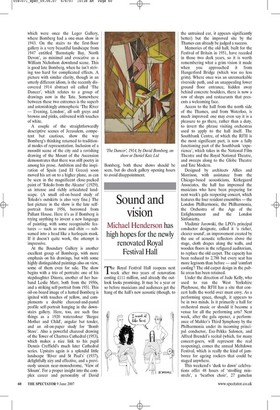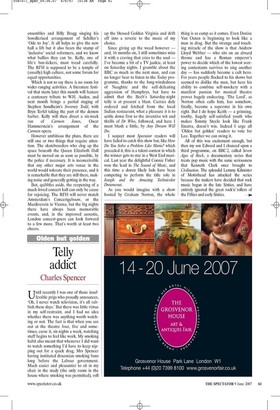Sound and vision
Michael Henderson has high hopes for the newly renovated Royal Festival Hall The Royal Festival Hall reopens next week after two years of renovation costing £111 million, and already the outlook looks promising. It may be a year or so before musicians and audiences get the hang of the hall's new acoustic (though, to the untrained ear, it appears significantly better) but the improved site by the Thames can already be judged a success.
Memories of the old hall, built for the Festival of Britain in 1951, have receded in those two dark years, so it is worth remembering what a grim vision it made when you approached it from Hungerford Bridge (which was no less grim). Where once was an unremarkable riverside path, and an unappealing lower ground floor entrance, hidden away behind concrete boulders, there is now a row of shops and restaurants that presents a welcoming face.
Access to the hall from the north side of the Thames, and from Waterloo, is much improved: one may even say it is a pleasure to go there, rather than a duty, to invert the phrase visiting orchestras used to apply to the hall itself. The Southbank Centre, of which the RFH is the most significant part, is now a fully functioning part of the Southbank 'experience', which takes in the National Film Theatre and the Royal National Theatre, and sweeps along to the Globe Theatre and Tate Modern.
Designed by architects Allies and Morrison, with assistance from the Chicago-based acousticians, Kirkegaard Associates, the hall has impressed the musicians who have been preparing for next week's gala reopening concert, which features the four resident ensembles — the London Philharmonic, the Philharmonia, the Orchestra of the Age of the Enlightenment and the London Sinfonietta.
Vladimir Jurowski, the LPO's principal conductor designate, called it 'a richer, clearer sound', an improvement created by the use of acoustic reflectors above the stage, cloth drapes along the walls, and wooden floors in the refigured auditorium, to replace the old carpet. The capacity has been reduced to 2,788 but every seat has more legroom than before — and 'comfort cooling'! The old carpet design in the public areas has been retained.
Under the direction of Jude Kelly, who used to run the West Yorkshire Playhouse, the RFH has a site that concert halls the world over must envy. As a performing space, though, it appears to be in two minds. Is it primarily a hall for orchestral music or should it become a venue for all the performing arts? Next week, after the gala opener, a performance of Mahler's Third Symphony by the Philharmonia under its incoming principal conductor, Esa-Pekka Salonen, and Alfred Brendel's recital (which, for many concert-goers, will represent the real reopening), comes the annual Meltdown Festival, which is really the kind of jamboree for ageing rockers that could be staged anywhere.
This weekend's 'dusk to dawn' celebrations offer 48 hours of 'strolling minstrels', a `beatbox choir', 27 gamelan ensembles and Billy Bragg singing his bowdlerised arrangement of Schiller's 'Ode to Joy'. It all helps to give the new hall a lift but it also bears the stamp of 'inclusive' social reformers, and we know what bullies they can be. Kelly, one of life's box-tickers, must tread carefully. The RFH is supposed to be a temple of (usually) high culture, not some forum for equal opportunities.
Which is not to say there is no room for wider-ranging activities. A literature festival that starts later this month will feature a centenary tribute to W.H. Auden, and next month brings a partial staging of Stephen Sondheim's Sweeney Todd, with Bryn Terfel taking the part of the demon barber. Kelly will then direct a six-week run of Carmen Jones, Oscar Hammerstein's arrangement of the Carmen opera.
However ambitious the plans, there are still one or two things that require attention. The skateboarders who clog up the space beneath the Queen Elizabeth Hall must be moved on as soon as possible, by the police if necessary. It is inconceivable that any other major arts venue in the world would tolerate their presence, and it is remarkable that they are still there, making noise and generally getting in the way.
But, quibbles aside, the reopening of a much-loved concert hall can only be cause for rejoicing. The RFH will never match Amsterdam's Concertgebouw, or the Musikverein in Vienna, but the big nights there have always been memorable events, and, in the improved acoustic, London concert-goers can look forward to a few more. That's worth at least two cheers.





























































 Previous page
Previous page